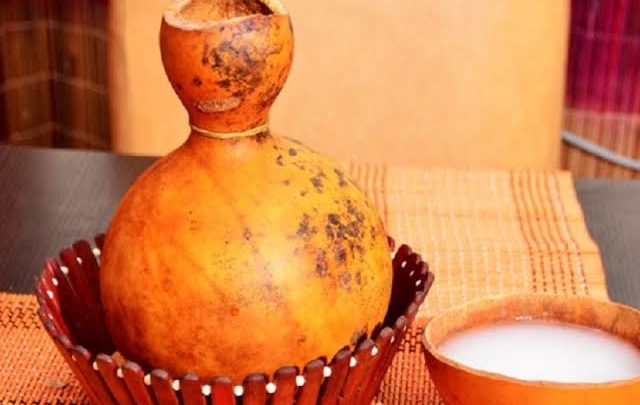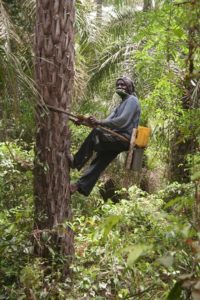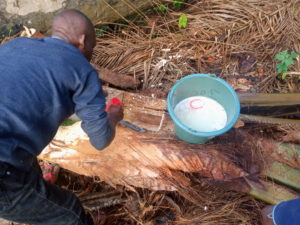
Have you ever tasted a freshly tapped palm wine? Your taste buds would certainly throw you into cloud nine.
Many who have that experience describe palm wine’s taste as delectably milky and lusciously sweet. However, its syrupy taste diminishes with time when it grows more sour and yeasty.
This effervescent yet refreshing drink known locally as ukod nsung ( loosely translated as drink for flies since it attracts bees) is a clear, colorless juice containing 12–15% sucrose (by weight) and trace amounts of reducing sugars including glucose, fructose, maltose and raffinose. The sap contains approximately 0.23% protein, 0.02% fat.
Half of the total sugars are fermented during the first 24 hour. When left to ferment, it can still be used to produce kai-kai ( Ogogoro), a strong alcoholic drink that tastes like gin. The people of Uruan in the State are renowned for their expertise in brewing the best quality of gin from this precious liquid.
Palm wine’s only ingredient: sap is gotten from palm tree. This includes; Raffia palms, coconut palms, date palms, and oil palms; all these produce the sugary liquid that turns into palm wine.
Nevertheless, in Akwa Ibom State, palm wine is mostly gotten from raffia palms and oil palms and they are usually found in rural areas near palm groves.

How Palm Wine is Gotten
Palm wine tapping is not an all comers affair. It requires skill and experience. Most tappers say they learned the skill from their parent. To tap the sap, harvesters climb enormous palms using a raffia rope known in the local parlance as Ikpò. Some set up ladders usually made from the stick of the palm tree. This however depends on the height of the palm tree. At the crown of the tree, about 15 cm from the top of the trunk, a small incision in the bark of the palm is carefully made—sometimes cutting and draining entire tree—and place a clean gourd or plastic container at the base to catch dripping sap. Tappers return at morning and evening to turn over what they have gotten. Some palms produce its sap running into days and some weeks.

Be that as it may, the sap can still be tapped from fallen trees especially oil palm. The difference is that the tapper will cut the crown deeper and wider so as to have space to scoop the sap. The taste of the sap gotten from the oil palm tree is sweeter and surreptitiously intoxicating than that of the raffia palm. This particular palm wine is known in Akwa Ibom State as Ukod Eyop ( loosely translated as drink derived from oil palm tree).
After the collection, the tapper has the option of adding the bark of a tree known as edad to the palm wine. The edad as the name loosely implies “reddish” would add a little reddish colour and flavour to the drink. The essence of adding this is to prevent the stomach of those who drink it to have a grumbling sound. This addition is renowned locally for its potency to help prevent the growth of prostrate cancer. However, not all tappers add it to palm wine. After this, the tapper filters it by using local leaves known in Ibibio land as mkpatat. He also has the option of using modern filter. This is to clear off the residues from the tree. After this, the filtered palm wine is ready for drinking. It is usually measured in a bottle of beer and sold between N100 and N150 depending on the location. To relish the taste properly on your palate, the small local calabash is the best option for a cup.
Health Benefits
Although palm wine is relatively cheap as compared to other alcoholic beverages, it may be seen by many as just a local alcoholic drink which has an irresistible taste and also refreshing, yet, its value is beyond the delight it offers.
Health experts say the presence of the vitamins in palm wine such as vitamin C and B’s play vital role in building the connective tissues of the body and the blood vessels of the eye thus preventing related eye problems like cataracts and macular degeneration.
Vitamin B1 and B12 found in palm wine is said to be essential in solving vascular related issues that concern the retina which could result in chronic inflammation among other problems.
Since the sap contains approximately 0.23% protein, that helps to serve as the building block of the macro-nutrient – towards building and improving the body cells.
Interestingly, new born babies also benefit from palm wine. palm wine has long served as an important beverage for lactating mothers. It has been locally proven to help mothers whose breast milk are low by increasing the flow for adequate breastfeeding.
For some, especially men, who prefer the palm wine to ferment at least overnight thus generate more yeast, they have attested to the aphrodisiac efficiency of its dreg.
What is more, palm wine is known to contain essential nutrients like potassium, magnesium, iron, zinc among other minerals and vitamins. All the health benefits that comes from these nutrients become the inheritance of those who have communion with it.
Economic Benefits
Many have made wholesome livelihood and also attained modest goals through palm wine business.
Interestingly, the acetic acid from palm wine has found a place in the rubber industry as a coagulant. It is highly prized.
When this reporter spoke with palm wine markers at a renowned palm wine market at Ikot Mbang Village in Ibiono Ibom Local Government Area, most of the respondents said they make meaningful profit through the business.
According to James Nyah who says he gets palm wine supply from Ikono Local Government Area to sell in the capital city at a gainful price reveals that in 15 years of being dedicated to the business, he has been able to build a house and also cater for his family responsibility.
The middlemen are not the only ones who have made headway in the palm wine business. A Palm wine tapper in Ikot Ekere, Ibesikpo Asutan, Daniel Akanimo boast that the money he makes monthly is more than that of some Civil servants. He says ” There is hardly a day I don’t make up to N4000 from my palm wine business. Multiply that within a month. It is just that family responsibility is much. By now, I should be driving my car.”
Yet, what is the secret of making sustained profit in the business? A palm wine retailer in Ikot Ada Idem in Ibiono Ibom Local Government Area, Udo Akpan states ” The secret is being honest in your business. I have a tapper who do not mix water in the palm wine he supplies to me and I don’t mix it too.
” Many spots that sell palm wine in the town mix water, add saccharine and cabin biscuit just for profit. Those who patronize such combination may stool. I don’t do that here and my customers are aware. That is the reason people leave the town down to this village to drink.”
The palm wine retailer says because of his honesty and persistence in the business, over the years, he has built two houses, trained some of his children in the university and attend to other family responsibilities.
The Future of Palm wine
In spite of the love the locals have for palm wine and the economic benefits it springs, the future for palm wine in the State seems bleak.
RELATED: Before A’Ibom Says Good-bye To Her Monkeys
Nyah quoted earlier notes that as the day passes, he has experienced low supply of palm wine from tappers. The reason? ” Our society does not value anyone who is a palm wine tapper. If you mention to anyone that you are a tapper, they mock at you. So, these tappers change their line of business at the slightest opportunity.”
He further notes that the children of these tappers who are trained in school do not want to take from their parents hence leaving the palms to lie waste. Nyah adds ” I can tell you that in the near future, you won’t see people to tap palm wine again. The skill is learned and when people are untrained in it, how do you then expect to see palm wine to drink?
Yet, there’s still another challenge. Akanimo mentioned earlier says human activities especially buildings have affected so many lands where palm trees are found.
He explains ” Population is growing and people are building everywhere. They will have to cut down palm trees on the land they want to build or the ones that are nearby so that it doesn’t fall on the house. With that, you won’t expect us to have palm wine like before.”
The tapper however recommends that for the issue to be salvaged, members of the society have to stop despising palm wine tappers especially as they contribute to the drinking delight of many.
He advise that government must also develop special interest in the palm business by exploiting large portion of swamps which the State is blessed with.
Akanimo notes ” Palm trees grow better in swamps and our State have so many swampy areas. Since people are building much on land, and most of the swamps are not used, the government should take serious steps to plant palm trees there. If that is done, in the near future, it could become a big business where we export palm wine to other States just as Cross Rivet State are selling corked Palm Boost to us”.
Yes, when next you enjoy palm wine, think of what you can do to help the State remain the home of the luscious local liquid. Think of the business opportunities available for exploit and most importantly be thankful for the bountiful reward we get from this sweetened liquid dripping off our palm trees.




